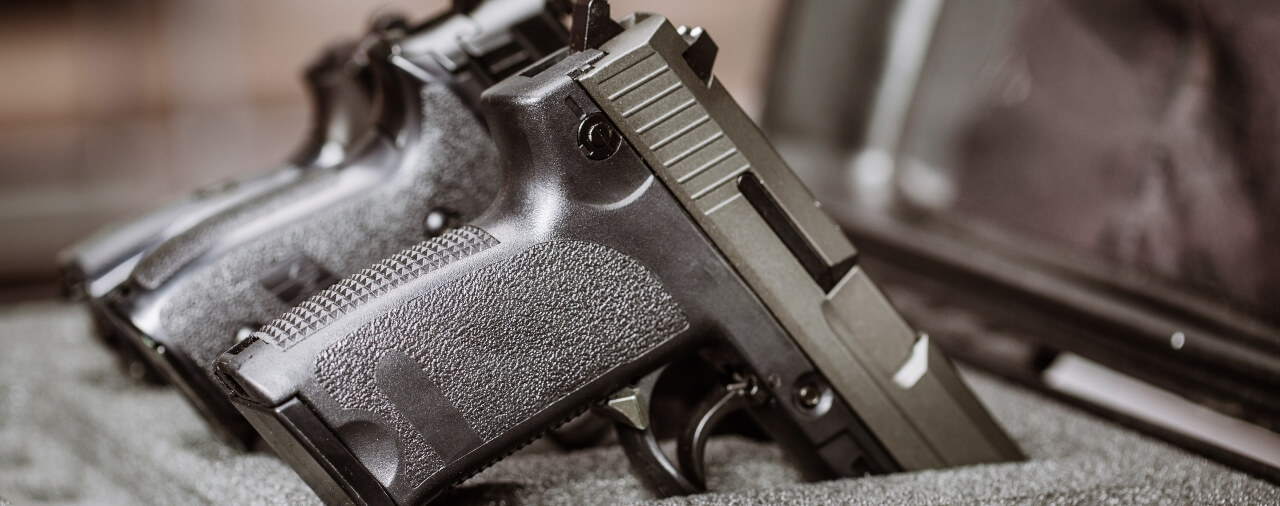- Introduction
- Facts and Procedural History: 26 I&N dec. at 922-23
- Statute and Issue Before the Board: 26 I&N dec. at 922-23
- BIA’s Reasoning and Decision: 26 I&N dec. at 923-24
- Conclusion
Introduction
On March 3, 2017, the Board of Immigration Appeals (BIA) issued a precedential decision in the Matter of Flores-Abarca, 26 I&N Dec. 922 (BIA 2017) [PDF version]. In this decision, the Board held that an offense for transporting a firearm under Oklahoma State law is categorically a firearms offense under section 237(a)(2)(C) of the INA, notwithstanding that section 237(a)(2)(C) does not specifically include the term “transporting.” In reaching this result, the Board found that section 237(a)(2)(C) “is broadly construed to encompass all types of firearms offenses” (emphasis added).
In this article, we will examine the facts and procedural history of the Matter of Flores-Abarca, the Board’s reasoning and decision, and what this decision will mean going forward.
Facts and Procedural History: 26 I&N dec. at 922-23
The respondent, a native and citizen of Mexico, entered the United States without inspection in 1988. On January 20, 2004, the respondent was convicted of transporting a loaded firearm in violation of title 21, section 1289.13, of the Oklahoma Statutes. The respondent was placed in removal proceedings.
In removal proceedings before an immigration judge, the respondent conceded that he was removable, but he sought relief in the form of cancellation of removal under section 240A(b)(1)(C) of the INA [see article]. The Immigration Judge determined that the respondent was ineligible for cancellation of removal because his Oklahoma conviction constituted a firearms offense under section 237(a)(2)(C) of the INA.
The Immigration Judge, after denying his application for cancellation of removal, ultimately found that the respondent was removable under section 212(a)(6)(A)(i) of the INA as an alien who is present in the United States without being admitted or paroled. The respondent appealed the Immigration Judge’s decision to the BIA, arguing that his conviction was not a firearms offense as defined in section 237(a)(2)(C) of the INA, and therefore that he should be eligible to apply for cancellation of removal.
Statute and Issue Before the Board: 26 I&N dec. at 922-23
Section 237(a)(2)(C) of the INA is a deportability provision covering firearms offenses. The statute reads as follows:
Any alien who at any time after admission is convicted under any law of purchasing, selling, offering for sale, exchanging, using, owning, possessing, or carrying, or of attempting or conspiring to purchase, sell, offer for sale, exchange, use, own, possess, or carry, any weapon, part, or accessory which is a firearm or destructive device (as defined in section 921(a) of title 18) in violation of any law is deportable.
Please see the section in our article about deportability for criminal and grounds as well [see section].
The Board quoted from the relevant provision of title 21, section 1289.13 of the Oklahoma Statutes, the statute under which the respondent had been convicted:
it shall be unlawful to transport a loaded pistol, rifle or shotgun in a landborne motor vehicle over a public highway or roadway.
The issue at hand in the Matter of Flores-Abarca was whether the respondent’s Oklahoma State conviction fell under section 237(a)(2)(C) of the INA. For reasons that we shall examine in the next section of this article, the Board found that the respondent’s conviction was a categorical firearms offense under section 237(a)(2)(C).
BIA’s Reasoning and Decision: 26 I&N dec. at 923-24
The Board explains that the respondent took the position that the crime of transporting a firearm is not covered by section 237(a)(2)(C). His argument was that the crime of transporting a loaded firearm does not constitute either “possessing” or “carrying,” the two terms specified in the immigration statute.
The respondent’s case arose from the jurisdiction of the United States Court of Appeals for the Fifth Circuit. The Board explained that there is no Fifth Circuit precedent addressing “the breadth of section 237(a)(2)(C).” However, various other circuit courts have done so.
The Board noted that in Valerio-Ochoa v. INS, 241 F.3d 1092, 1095 (9th Cir. 2001) [PDF version], the Ninth Circuit held that section 237(a)(2)(C) was intended by Congress “to embrace the entire panoply of firearms offenses.” Multiple other circuits have also interpreted the statute broadly. The Board notes that the Second and Fourth Circuits, in Kuhali v. Reno, 266 F.3d 93, 103 (2d Cir. 2001) [PDF version], and Hall v. INS, 167 F.3d 852, 855 (4th Cir. 1999) [PDF version], respectively, found that the provision is “’exceedingly broad’ and ‘evinces an expansive purpose-to render deportable those aliens that commit firearms offenses of any type.’”
The Board then examined relevant precedent regarding the terms “possessing” and “possess” as used in section 237(a)(2)(C). The Board noted that in Aybar-Alejo v. INS, 230 F.3d 487, 489 (1st Cir. 2000) [PDF version], the First Circuit held that constructive possession occurs when an individual “exercises dominion and control” over an object even when it is not in his or her immediate physical possession. The Board observed that the jury instructions for the respondent’s statute of conviction explained to the jury that an individual must “knowingly” and “willfully” transport his or her loaded firearm to be convicted under section 1289.13. Regarding “transportation,” the Board cited to the Supreme Court decision in United States v. Bass, 404 U.S. 336, 340 (1971) [PDF version], wherein the Supreme Court held that “virtually all transportations … involve an accompanying possession.” In Kuhali, 266 F.3d at 104-105, the Second Circuit held that exporting firearms “necessarily entails some degree of possession.”
The Board took the position that “it would be illogical to hold that unlawful possession of a loaded firearm would fall within the scope of section 237(a)(2)(C) but that unlawfully transporting the same weapon would not.” On this point, the Board found support for its position in the Ninth Circuit decision in Malilia v. Holder, 632 F.3d 598, 604 (9th Cir. 2011) [PDF version].
For the foregoing reasons, the Board read section 237(a)(2)(C) as covering the crime of transporting a loaded firearm “[i]n light of the ‘expansive text and history’ of section 237(a)(2)(C)” (the Board also discussed briefly that the legislative history of the provision supports this conclusion). Accordingly, the Board held that the Oklahoma statute of conviction in the Matter of Flores-Abarca was categorically an offense under section 237(a)(2)(C). For these reasons, the Board agreed with the Immigration Judge’s finding that the respondent’s Oklahoma conviction rendered him ineligible for cancellation of removal under section 240A(b)(1)(C) of the INA. The Board dismissed the respondent’s appeal.
Conclusion
As the Board discussed in its decision, various circuit courts had already reached the conclusion that section 237(a)(2)(C) should be read as covering a broad range of firearms offenses. In the Matter of Flores-Abarca, the Board adopted this precedent in holding that the Oklahoma crime of unlawfully transporting a firearm falls within the broad scope of section 237(a)(2)(C).
In general, aliens should refrain from committing any firearms-related offenses, as these will generally be, at the very least, highly damaging and most likely fatal to an alien’s overall immigration situation and future immigration prospects.





